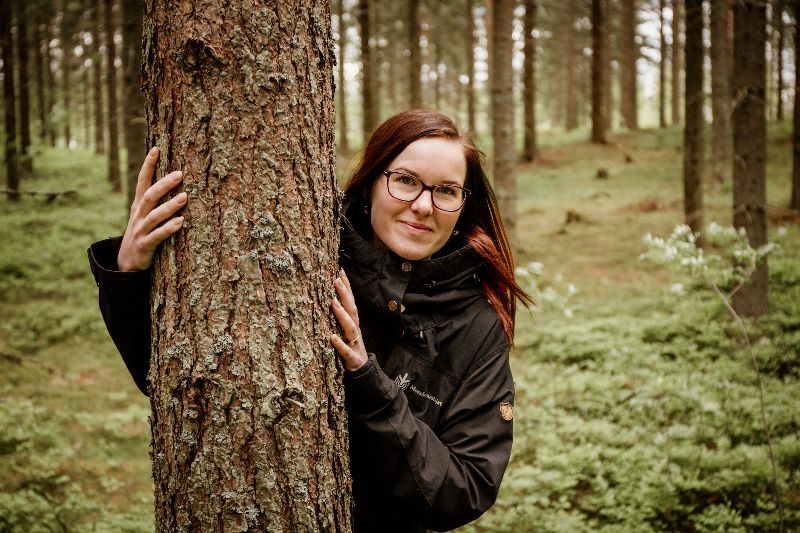Forest specialist
"In this work, I must be able to walk or ski in the woods for several kilometres. I may visit one to six different forest properties in one morning. Sometimes I just go there to check in which condition the roads are, and I don't need to go all the way into the woods. In the afternoon, I work in the office: I make plans, manage timber sales and sell sapling stand management and planting work."

- Matleena Teppola
- Forest specialist at the South Savo Forest Management Association.
- Graduated with a Master of Natural Resources degree from the Southeast Finland University of Applied Sciences.
- 11 years of work experience in the field.
Briefly explain what you do for a living.
I work as a forest specialist. It means that I help forest owners in various forest-related matters, such as timber sales, planting and sapling stand management. The concrete work is done by loggers and excavator drivers under my guidance. I also sell forest assessments and forestry plans. The forest management association provides a wide range of services, and I am the first point of contact for customers. In other words, in a way, I am the salesperson or customer service person who the forest owners contact.
How have you ended up in the profession of your choice?
My parents are forest owners. My father often took me to the woods when I was a kid. These childhood experiences generated an interest in the forest sector in me. My father also took me to forest skills competitions where I met other forest owners.
Describe your typical working day or week.
I start my working days by reading the emails. In the morning, I usually arrange visits to forest properties. In other words, I walk around forest parcels, either together with the forest owners or by myself. I also supervise felling and other forestry work. In this work, I must be able to walk or ski in the woods for several kilometres. I may visit one to six different forest properties in one morning. Sometimes I just go there to check in which condition the roads are, and I don't need to go all the way into the woods. In the afternoon, I work in the office: I make plans, manage timber sales and sell sapling stand management and planting work. Sometimes, I also have mandatory meetings.
What kind of work environment or working hours do you have?
I work in the woods and in the office. This work can also be done fully remotely. I plan my working hours and schedule my work in my calendar myself. Mainly because I have small children, my normal working hours on weekdays are between 8 a.m. and 4 p.m. You can also do this work in the evenings and on weekends if you want and are able to.
What kind of competence or qualities are required in the profession?
I think customer service skills are of great importance. In this profession, you have the opportunity to work with a wide range of people, including forest owners, wood buyers and loggers. You must also be able to tolerate all kinds of weather conditions and have stamina, as you must go into the woods, no matter what the weather is like. In my opinion, being interested in the forests is also important. Of school subjects, biology and geography are essential, as in this work you need to know plants, for example.
This job is suited for very different personalities in the sense that you can plan and regulate the content of your working days yourself. One day you may be social and meet forest owners. The next day you may be marking a stand for cutting all by yourself. In other words, you can regulate your own social burden.
What is the best thing about your profession?
The best thing about it is freedom, because you can determine your own working hours. Sometimes you can work shorter hours and sometimes longer hours. Moreover, this work is very varied.
What are the downsides of the profession or what seems challenging?
It feels good to do work with responsibly. But sometimes the responsibility for the forest owner's property weighs on you, as you must manage the forest owned by another person well and do good timber sales.
What would you tell a person considering the profession of a forest specialist?
I think this is the best profession there is. If you enjoy nature and like customer service, this work is very good for you.
All sectors must change as the operating environment changes. The forestry sector will also certainly undergo changes. A typical forest owner may no longer live on the forest holding themselves. More and more matters are managed remotely.
How do you see the future of your profession?
The meaning of forests is no longer limited to economic factors, so in the future, attention will be paid to issues other than economic returns. Forest owners have increasingly different wishes for how their forests should be managed. Therefore, there must also be different services. It may be that in the future we will be selling carbon sinks, not just timber. This requires adopting a new mindset in the forestry sector. Changes may also occur in forest-related legislation, and we must keep informed about them. In this work you can develop yourself all the time, and there is plenty of new things to learn.
Photo: Ilona Savitie
